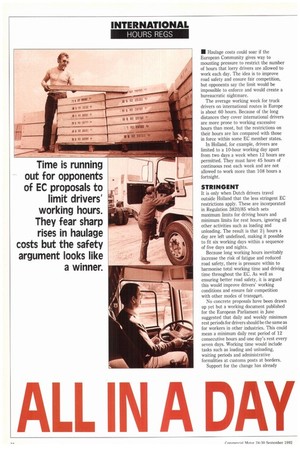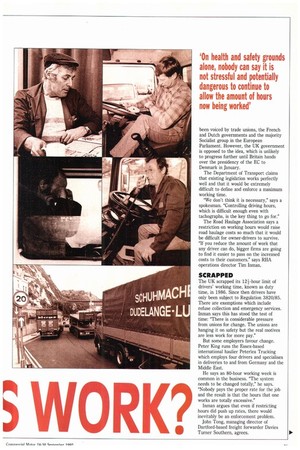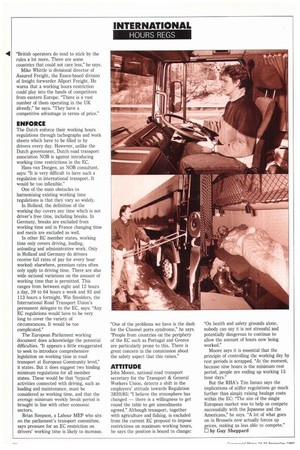ALL IN A DAY WO
Page 26

Page 27

Page 28

If you've noticed an error in this article please click here to report it so we can fix it.
Haulage costs could soar if the European Community gives way to mounting pressure to restrict the number of hours that lorry drivers are allowed to work each day. The idea is to improve road safety and ensure fair competition, but opponents say the limit would be impossible to enforce and would create a bureaucratic nightmare.
The average working week for truck drivers on international routes in Europe is about 60 hours. Because of the long distances they cover international drivers are more prone to working excessive hours than most, but the restrictions on their hours are lax compared with those in force within some EC member states.
In Holland, for example, drivers are limited to a 10-hour working day apart from two days a week when 12 hours are permitted. They must have 45 hours of continuous rest each week and are not allowed to work more than 108 hours a fortnight.
STRINGENT
It is only when Dutch drivers travel outside Holland that the less stringent EC restrictions apply. These are incorporated in Regulation 3820/85 which sets maximum limits for driving hours and minimum limits for rest hours, ignoring all other activities such as loading and unloading. The result is that 21 hours a day are left undefined, making it possible to fit six working days within a sequence of five days and nights.
Because long working hours inevitably increase the risk of fatigue and reduced road safety, there is pressure within to harmonise total working time and driving time throughout the EC. As well as ensuring better road safety, it is argued this would improve drivers' working conditions and ensure fair competition with other modes of transpprt.
No concrete proposals have been drawn up yet but a working document published for the European Parliament in June suggested that daily and weekly minimum rest periods for drivers should be the same as for workers in other industries. This could mean a minimum daily rest period of 12 consecutive hours and one day's rest every seven days. Working time would include tasks such as loading and unloading, waiting periods and administrative formalities at customs posts at borders.
Support for the change has already been voiced by trade unions, the French and Dutch governments and the majority Socialist group in the European Parliament. However, the UK government is opposed to the idea, which is unlikely to progress further until Britain hands over the presidency of the EC to Denmark in January.
The Department of Transport claims that existing legislation works perfectly well and that it would be extremely difficult to define and enforce a maximum working time.
"We don't think it is necessary," says a spokesman. "Controlling driving hours, which is difficult enough even with tachographs, is the key thing to go for."
The Road Haulage Association says a restriction on working hours would raise road haulage costs so much that it would be difficult for owner-drivers to survive. "If you reduce the amount of work that any driver can do, bigger firms are going to find it easier to pass on the increased costs to their customers." says RHA operations director Tim Inman.
SCRAPPED
The UK scrapped its 121-hour limit of drivers' working time, known as duty time, in 1986. Since then drivers have only been subject to Regulation 3820/85. There are exemptions which include refuse collection and emergency services. Inman says this has stood the test of time: "There is considerable pressure from unions for change. The unions are hanging it on safety but the real motives are less work for more pay."
But some employers favour change. Peter King runs the Essex-based international haulier Peterlea Trucking which employs four drivers and specialises in deliveries to and from Germany and the Middle East.
He says an 80-hour working week is common in the business. "The system needs to be changed totally," he says. "Nobody pays the proper rate for the job and the result is that the hours that one works are totally excessive."
Inman argues that even if restricting hours did push up rates, there would inevitably be an enforcement problem.
John Tong, managing director of Dartford-based freight forwarder Davies Turner Southern, agrees. "British operators do tend to stick by the rules a lot more. There are some countries that could not care less," he says.
Mike Whittle is divisional director of Assured Freight, the Essex-based division of freight forwarder Allport Freight. He warns that a working hours restriction could play into the hands of competitors from eastern Europe. "There is a vast number of them operating in the UK already," he says. "They have a competitive advantage in terms of price."
ENFORCE
The Dutch enforce their working hours regulations through tachographs and work sheets which have to be filled in by drivers every day. However, unlike the Dutch government, Dutch road transport association NOB is against introducing working time restrictions in the EC.
Hans van Dongen, an NOB consultant, says: "It is very difficult to have such a regulation in international transport. It would be too inflexible."
One of the main obstacles to harmonising existing working time regulations is that they vary so widely.
In Holland, the definition of the working day covers any time which is not driver's free time, including breaks. In Germany, breaks are excluded from working time and in France changing time and meals are excluded as well.
In other EC member states, working time only covers driving, loading, unloading and administrative work. Only in Holland and Germany do drivers receive full rates of pay for every hour worked: elsewhere, premium rates often only apply to driving time. There are also wide national variations on the amount of working time that is permitted. This ranges from between eight and 12 hours a day, 39 to 64 hours a week and 92 and 113 hours a fortnight. Win Smolders, the International Road Transport Union's permanent delegate to the EC, says: "Any EC regulations would have to be very long to cover the variety of circumstances. It would be too complicated."
The European Parliament working document does acknowledge the potential difficulties. "It appears a little exaggerated to seek to introduce comprehensive legislation on working time in road transport at European Community level," it states. But it does suggest two binding minimum regulations for all member states. These would be that "typical" activities connected with driving, such as loading and maintenance, must be considered as working time, and that the average minimum weekly break period is brought in line with other economic sectors, Brian Simpson, a Labour MEP who sits on the parliament's transport committee, says pressure for an EC restriction on drivers' working time is Likely to increase. "One of the problems we have is the dash for the Channel ports syndrome," he says. "People from countries on the periphery of the EC such as Portugal and Greece are particularly prone to this. There is great concern in the commission about the safety aspect that this raises,"
ATTITUDE
John Moore, national road transport secretary for the Transport & General Workers Union, detects a shift in the employers' attitude towards Regulation 3820/85: 'I believe the atmosphere has changed — there is a willingness to get round the table to get amendments agreed." Although transport, together with agriculture and fishing, is excluded from the current EC proposal to impose restrictions on maximum working hours, he says the position is bound to change: "On health and safety grounds alone, nobody can say it is not stressful and potentially dangerous to continue to allow the amount of hours now being worked."
Moore says it is essential that the principle of controlling the working day by rest periods is scrapped. "At the moment, because nine hours is the minimum rest period, people are ending up working 15 hour days," But the RHA's Tim Inman says the implications of stiffer regulations go much further than simply raising haulage costs within the EC: "The aim of the single European market was to help us compete successfully with the Japanese and the Americans," he says. "A lot of what goes on in Brussels now actually forces up prices, making us less able to compete." 0 by Guy Sheppard








































































